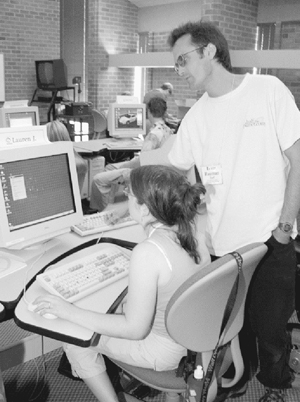Chapter Five
Define Success for Yourself
Life is not so much a matter of holding good cards,
but sometimes of playing a poor hand well.— Robert Louis Stevenson —
This book is about helping young people achieve success. But what do we mean by "success?" Success means different things to different people. For some, positive family relationships and friendships are most important. For others, academic and career achievements weigh heavily in their definition of success. Some measure success primarily in religious aspects of their lives. Clearly, "success" is a subjective concept, unique to the individual, and related to many aspects of our lives—personal, social, spiritual, academic, and professional.
The people with disabilities who contributed to this book define success in many different ways. Here are a few examples:
- Success is defined by who we are, what we believe in, and what we think it means to be "successful." For some it is money, for others, relationships; for others, it's family; for others, it's jobs; for some it is religion; and for others it is education. I believe that success is reaching my own personal dreams. I'm not done with my dreams, but know that I have been successful so far because I've worked toward my goals regardless of my disability. (college student who is deaf)
- Success is possessing the capability for self-determination. Self-determination is the ability to decide what I want to do with my life and then to act on that decision. (high school student who is blind)
- A successful life is one where I can be actively engaged in creative activities that make a contribution to the lives of others. Success is a kind of by-product and NOT an end in itself! (professor who is blind)
Successful people do not succeed all the time. They tend to experience many setbacks and failures, perhaps more than less successful people because they take more risks. Failing to take action minimizes our opportunities for success, to learn from our experiences, and to lead self-determined lives. In this chapter you'll learn how successful individuals have defined success for themselves and how you can help young people arrive at their own definitions for success.

So what can we learn about the meaning of "success" from the individuals with disabilities who contributed to this book? Young people who complete the online activities will learn the following:
Success can be achieved by everyone.- Success means different things to different people.
- Success should be related to a person's own personal belief system and values.
- Success can be measured in specific outcomes, as a process, or as a state of mind.
- Standards for success can be related to personal, social, spiritual, academic, or employment goals.
- Success can be defined for small, short-term goals, for overall life achievements, and for steps along the way.
- Self-determination—being able to make and act on important decisions in your life—is a measure of success.
- Successful people with disabilities accept disability as one aspect of who they are, but they do not allow their disabilities to define who they are or to dictate their goals in life.
- Successful people are socially competent. They make connections with others and value friendships.
Successful people know that they do not have control of everything in their lives. However, they can make choices and determine the course for the most important aspects of their lives.
The e-mentoring administrator can select appropriate electronic mail messages from the following examples and send those with titles labeled Mentor Tip to the mentors only and the messages labeled E-Community Activity to the entire online community. Use these examples to stimulate other ideas for online discussions. It is desirable that, ultimately, most discussion topics come from the mentors and protégés.